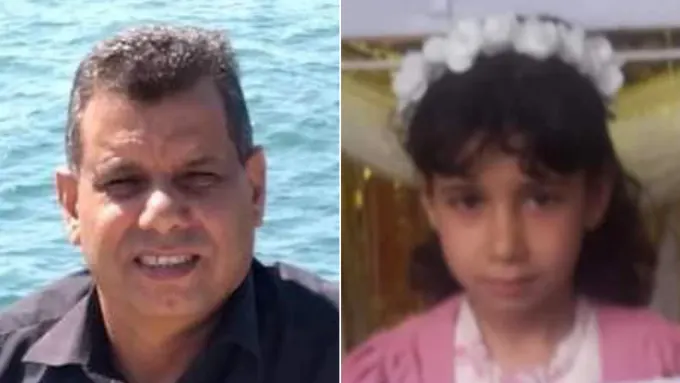In the midst of the ongoing conflict in Gaza, the harrowing tale of Sanaa Abu Tabaq and her young daughter, Sham, stands out as an emblem of both loss and the unexpected complexities of war. At just five years old, Sham carries the weight of memories that no child should ever have to bear. Her piercing gaze reflects a painful past filled with violence and upheaval, having witnessed the tragic deaths of her father, Akram, and her older sister, Yasmeen, during a chaotic moment in their lives.
Sanaa, a dedicated mother and a schoolteacher, had created a modest life for her family in Beit Lahia, located in the northern region of Gaza. Alongside her husband, she worked tirelessly to support their two daughters. However, everything changed following the Hamas attack on Israel on October 7, 2023, and the subsequent military response that plunged Gaza into turmoil. Forced to flee their home due to relentless bombardments, Sanaa and her family sought refuge in a United Nations health clinic situated in the Jabalya refugee camp.
After weeks of displacement, a brief ceasefire in late November offered a glimmer of hope. The family eagerly prepared to return home, filled with joy and relief. “We were so happy we weren’t even able to sleep,” Sanaa recalled. However, their return journey turned tragic in an instant. As they approached their home, gunfire erupted unexpectedly, a harrowing experience that would change their lives forever.
Caught in the crossfire, Sanaa, Akram, and Yasmeen were struck by bullets. Yasmeen, only seven years old, suffered severe injuries, and her father was hit in the stomach. Sanaa herself was shot in the leg. In a desperate attempt to find safety, Akram suggested they crawl to seek help, but fate had other plans. “They finished him off!” Sanaa recounted, heartbroken as she lost not only her husband but also her daughter Yasmeen, who succumbed to her injuries while Sanaa held her.
In a state of shock and despair, Sanaa and Sham managed to crawl to a partially destroyed house, seeking refuge as night fell. They huddled together in fear, with Sanaa whispering words of comfort to her daughter, even as she feared for their lives. The night was fraught with uncertainty, and as dawn broke, the sounds of Israeli tanks filled the air. Sanaa braced herself for the worst, assuring Sham that they would face whatever came together.
When Israeli soldiers eventually entered the house, the situation became tense. Sanaa pleaded with them, desperately trying to convince them that she and Sham were not a threat. Despite the chaos, the soldiers provided medical attention to the wounded mother and daughter, a moment of unexpected compassion amid the horrors of war. However, Sanaa faced the grim reality of losing her family. When she asked about Yasmeen’s body, the soldiers offered no comfort, leaving her to grapple with the loss of her beloved children.
As they were transported to an Israeli hospital for treatment, Sanaa experienced a mix of gratitude and anguish. The soldier who spoke to her in Arabic facilitated their transfer, but the memories of her family’s violent end haunted her. “This was a miracle from God,” she reflected on the soldier’s actions, recognizing the complexity of her feelings. While she appreciated the help, she struggled to reconcile it with the loss she had suffered.
After enduring a lengthy recovery process, Sanaa and Sham now find themselves in a Palestinian hospital in Jerusalem, living in a shared room, grappling with their new reality. For eight months, they have been in limbo, torn between the safety of their current situation and the longing for their former lives, which have been irrevocably altered by the violence they endured.
As Israeli authorities plan to return them to Gaza, Sanaa feels a deep sense of dread. The uncertainty of their future weighs heavily on her, compounded by the unresolved grief of losing her husband and daughter. “I have no idea what happened to their bodies,” she lamented, the ache of unanswered questions lingering in her heart.
The Israeli military has denied responsibility for the deaths of Sanaa’s family, attributing the tragedy to a chaotic exchange of fire. However, Sanaa firmly rejects their claims, insisting that they had no warning and no chance of escape. Her story serves as a poignant reminder of the human toll of conflict, highlighting the complexities of survival in the face of unimaginable loss.
responsibility for the deaths of Sanaa’s family, attributing the tragedy to a chaotic exchange of fire. However, Sanaa firmly rejects their claims, insisting that they had no warning and no chance of escape. Her story serves as a poignant reminder of the human toll of conflict, highlighting the complexities of survival in the face of unimaginable loss.
In the end, Sanaa’s experience encapsulates the struggle for survival amidst the devastation of war, illustrating the profound impact of violence on families and individuals. The narrative of Sanaa and Sham is not just one of tragedy; it is also a testament to resilience and the enduring spirit of those caught in the crossfire of larger geopolitical struggles. As they navigate the challenges ahead, their story echoes the urgent need for compassion, understanding, and a commitment to peace in a region long marred by conflict.









